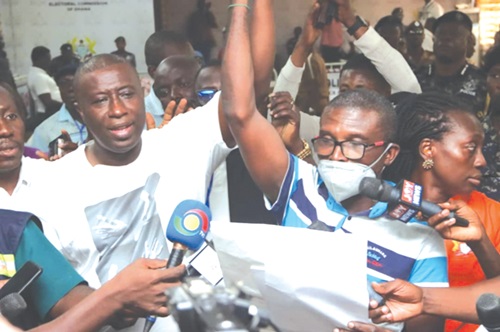
EC’s collation exercise — Implications for future elections
The visuals of a heavily guarded Electoral Commission (EC) building both outside and inside by the police added a different dimension to the just ended 2024 elections which Ghana has received several commendations for.
Granted, if out of 276 constituencies, there were outstanding issues in nine, then the commendations are well deserved.
However, deviant cases have a way of soiling the overall picture.
Following the re-collation in seven constituencies, public discourse and sentiments expressed by Ghanaians is worrying. What does this all mean for the long term?
EC mandate
The re-collation raises the question of what the EC can do, to correct declarations it believes breached proper procedure. The EC has a constitutional function “to conduct and supervise all public elections and referenda.”
Elections are, however, governed by Constitutional Instruments (C.I). In the case of the 2024 presidential and parliamentary elections it is C.I.127 which, among other things, splits the returning officer function between two persons – a) the Chair of the EC as the returning officer for presidential elections and b) and a returning officer appointed by the EC for parliamentary elections.
There are two issues of contention here. First, does the E.C. has the power to invalidate a declaration made by returning officers in parliamentary elections if it determines there were breaches?
For example, in the case of Techiman South, EC asserts that 135 out of the 282 polling stations were used to declare a winner.
Second, can EC change the designated location for results collation as in the case of Nsawam- Adoagyiri, which was initially moved to the Tesano police station?
Keep in mind that EC also pointed to other reasons such as violence, threats, duress, the returning officers’ inability to complete collation and declaration of results.
As the body charged with conducting and supervising all public elections, it seems reasonable and proper to administratively allow the EC to correct such anomalies, so a winner is properly declared.
For example, if the appropriate number of polling stations were not used to declare results, the remainder of which can alter an outcome, then such corrective action cannot be placed outside of the administrative purview of the EC.
Invalidating results
But for a society quick to ask “where in the law does it say…” it is imperative to make it explicitly clear in law, what the EC is permitted to do. More importantly, there must be guidelines for deciding how to invalidate a declaration and consistently apply it to all cases.
It may seem contradictory to argue for empowering the EC in law with guidelines on how to administratively invalidate declarations not properly done, in its estimation, but also argue for limiting the scope of such administrative powers.
But that is what well-crafted administrative rules should be able to do –enable action but also restrain administrative overreach.
The situation we need to avoid is creating a loophole for a future Electoral Commission, who dissatisfied with the outcome of an election because of a hidden preference, invokes the law to invalidate declared results in the final collation process.
Co-operation
This exercise further heightens the need for greater cooperation between the EC and political parties who already feel the need to engage in extrajudicial activities during elections all in the name of protecting the ballot.
The deepening mistrust, narratives of a compromised EC, and allegations of rigging all combine to signal that the freeness and fairness of elections cannot be left solely to the election management body. In addition, it further weakens the institution and erodes trust in the EC, the body charged with conducting and supervising elections.
Let’s not forget that the National Commission for Civic Education (NCCE) in the 2024 Matters of Concern To The Ghanaian Voter found that confidence in our electoral system has dropped from 67 per cent in 2016 to 42 per cent in 2024.
The report also noted that “those without confidence pointed to leadership issues, concerns over transparency, and the political influence on the Electoral Commission.”
This is unfortunate because extrajudicial activities, inflamed by unstrained political temperaments, and a weakened election management body can have the unfortunate consequence of creating serious challenges for election security.
The onus is on the EC to foster greater cooperation with stakeholders and ultimately restore a lot of lost trust in the institution. I have no qualms with the EC insisting on the right thing being done but it cannot overlook how its decisions and posture have unintended consequences.
This call does not absolve political parties and their supporters of conduct that undermines building positive relationships, rhetoric that fuels mistrust, and extrajudicial activities that potentially threaten the very security of the ballot they seek to protect.
The EC, including all stakeholders, have four years to address all these issues satisfactorily before the 2028 elections for the sake of Ghana’s democracy.
The writer is the Project Director, Democracy Project
